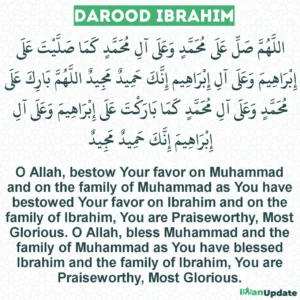Alhamdullilah Meaning In English and Arabic Text

“Alhamdulillah meaning” is a profound Arabic phrase that holds great significance in Islamic culture and is widely used by Muslims from diverse backgrounds. This phrase, known as “Tahmid” (praising) in Arabic, is deeply rooted in the texts of the Quran and Hadith.
Beyond its Islamic context, “Alhamdulillah” is also commonly used by non-Muslim speakers of the Arabic language. In this article, we will delve into the meaning, pronunciation, and Arabic text of “Alhamdulillah”, providing a comprehensive understanding of this remarkable phrase.
Alhamdullilah Meaning In English
In English, Alhamdullilah means All praise is due to Allah or Thanks to Allah. ‘Hamd Allah’ that is, describing Him with Praise and Perfections, and exalting Him above everything that negates and contradicts that.
Alhamdullilah In Arabic
In Arabic Alhamdulillah is written,
ٱلْحَمْدُ لِلّٰهِ
Alhamdulillah For Everything in Arabic
Alhamdulillah for everything in Arabic is written as:
ٱلْحَمْدُ لِلّٰهِ ﻟﻜﻞ ﺷﻲﺀ
Or
ٱلْحَمْدُ لِلّٰهِ ﻋﻠﻰ ﻛﻞ ﺣﺎﻝ
Meaning: All praise be to Allah in every situation.
“Alhamdulillah” is an Arabic phrase that means “All praise is due to Allah.” Allah, the Mighty and Sublime, is worthy of praise at all times – from the beginning, end, and continuation of creation. He is praised for the legislation He revealed to His servants and for His countless blessings.
The Prophet Muhammad (SAW) would often express gratitude through this phrase.
When receiving good news, he would say, “Alhamdulillahi ladhi bini’matihi tatimmus-saalihaat” (All praise be to Allah, whose favor makes righteous deeds complete). And when faced with challenging news, he would say, “Alhamdulillahi alaa kulli haal” (All praise be to Allah in every situation).
Allah, the most High, praised Himself and commanded us to do the same. In Surah An-Naml: 59, He says,
“Say: Praise and thanks be to Allah, and peace be on His slaves whom He has chosen (for His Message).”
Praising Allah is a fundamental aspect of our faith, and it is a pillar of Prayer. The opening chapter of the Qur’an, Al-Fatihah, begins with the verse,
“Alhamdulillahi Rabbil Alamin” (All the praises and thanks be to Allah, the Lord of Alamin).
It is obligatory for everyone to praise Allah and show gratitude for His blessings. These blessings are countless, including intellect, well-being, wealth, family, safety, and many more.
As Surah Ibrahim: 34 states, “And if you count the Blessings of Allah, never will you be able to count them.” Even the simple act of breathing is a blessing, as it occurs without our conscious effort or exhaustion.
Remember, praising Allah and showing gratitude are essential aspects of our faith. May we always acknowledge and thank Allah for His countless blessings and mercies.
Reflect on the challenges faced by those with breathing difficulties, for whom every breath is a struggle. This continuous process of inhaling and exhaling is a blessing often taken for granted.
Similarly, intellect, children, wealth, and religion are all immense blessings that cannot be enumerated. Allah, the Mighty and Sublime, deserves our praise for these gifts.
Praising Allah has numerous benefits, including pleasing Him. When we express gratitude for even the smallest things, like a morsel of food or a sip of drink, Allah is pleased with us.
Imam Ahmad bin Hanbal, may Allah bless him, would praise Allah for every bite he took, recognizing that acknowledging Allah’s provision is better than eating in silence.
This practice can be applied to our daily lives, where we can express gratitude before and after meals, saying “Alhamdulillah” (All praise is due to Allah).
Every form of praise is beneficial, and doing so can earn Allah’s pleasure. May Allah shower His pleasure upon us all, for He has power over all things.
In addition to pleasing Allah, praising Him has other benefits. It helps us cultivate a sense of gratitude, appreciate the blessings in our lives, and recognize Allah’s omnipotence.
By incorporating praise into our daily routines, we can strengthen our connection with Allah and find contentment in His provision.
READ ALSO: Hasbunallahu Wa Ni Mal Wakeel Meaning, Arabic Text & Benefits
Hadith on Importance of Saying Alhamdulillah
Abu Malik Al-Ash’ari (may Allah be pleased with him) reported: The Messenger of Allah (ﷺ) said: “Purity is half of iman (faith). ‘Alhamdulillah (all praise and gratitude belong to Allah)’ fills the scales, and ‘subhanAllah (how far is Allah from every imperfection) and ‘Alhamdulillah (all praise and gratitude belong to Allah)’ fill that which is between heaven and earth.”
Grade: Sahih (Al-Albani) English reference: Book 40, Hadith 927, Arabic reference: Book 1, Hadith 927
Hadith On Saying Alhamdulillah when someone sneezes
Abu Salih reported that the Prophet, may Allah bless him and grant him peace, said, “When one of you sneezes, he should say, ‘Praise be to Allah.’ When he says, ‘Praise be to Allah, ‘ his brother or companion should say to him [Yarhamuk-Allah], ‘May Allah have mercy on you.’ Then let the person who sneezed say [Yahdikum-ullah wa yuslihu balakum], ‘May Allah guide you and put your affairs in order.’”
Grade: Sahih (Al-Albani) English reference: Book 40, Hadith 927, Arabic reference: Book 1, Hadith 927.
Abu Huraira reported Allah’s Messenger (ﷺ) as saying: Five are the rights of a Muslim over his brother: responding to salutation, saying Yarhamuk Allah when anybody sneezes and says al-Hamdulillah, visiting the sick. following the bier. ‘ Abd al-Razzaq said that this hadith has been transmitted as mursal hadith from Zuhri and he then substantiated it on the authority of Ibn Musayyib.
Sahih Muslim 2162
Anas b. Malik reported that Allah’s Messenger (ﷺ) said: Allah is pleased with His servant who says: Al-Hamdu lillah while taking a morsel of food and while drinking.
Sahih Muslim 2734
Alhamdulillah is two things; one part of it is that you thank Allah and the second part of it is appreciation. In life you can have praise without thanks and sometimes in life you can have thanks without praise.
When we say alhamdulillah then we are saying that we praise Allah for whatever He’s doing whatever He’s doing is awesome. After we praise Him we are also thanking Him that He did it for us.
Al-Bukhaari (4631) and Muslim (2760) narrated that ‘Abdullah ibn Mas‘ood (may Allah be pleased with him) said: The Messenger of Allah (blessings and peace of Allah be upon him) said:
“There is no one to whom praise is more dear than Allah, and because of that He praised Himself. And there is no one whose protective jealousy is greater than Allah’s, and because of that He forbade immoral actions.”
Allah, may He be exalted, has no need of the worlds and their praise and righteous deeds. No matter what bad or good deeds they do, they cannot cause any harm to reach Allah, and they cannot cause any benefit to reach Him.
He, may He be glorified and exalted, has no need of them, but they are in need of Him, as He, may He be exalted, says (interpretation of the meaning):
“O mankind! it is you who stand in need of Allah, but Allah is Rich (Free of all wants and needs), Worthy of all praise” [Faatir 35:15].
But Allah, may He be exalted, loves for His slaves to obey Him, think positively of Him and give thanks to Him, and not to be ungrateful towards Him, for many great and wise reasons, of which we will mention some here:
Allah loves praise, so He praised Himself and commanded His slaves to praise Him, because He is deserving of that.
So He loves His slaves to describe Him as He deserves to be described, because if they do that, that will protect them from attributing to Him bad things that are not befitting to Him at all.

When To Say Alhamdulillah?
“Alhamdulillah” is a powerful zikr (remembrance) that offers numerous benefits, and Muslims are encouraged to recite it throughout the day. However, there are specific times and places where the Prophet Muhammad (SAW) would recite it, and he encouraged his followers to do the same. These appointed times include:
- Before going to bed
- After performing the obligatory (fard) Salah
Additionally, Muslims are encouraged to say “Alhamdulillah” 33 times after the fard prayer, as part of the various forms of remembrance. These forms include:
- Reciting “Subhaanallaah” (Glory be to Allah), “Alhamdulillaah” (All praise is due to Allah), “La ilaaha illallaah” (There is no deity except Allah), and “Allahu Akbar” (Allah is the Greatest) 25 times each, totaling 100.
- Reciting “Subhanallaah” 33 times, “Alhamdulillaah” 33 times, and “Allahu Akbar” 34 times, also totaling 100.
- Reciting “Subhanallaah” 10 times, “Alhamdulillaah” 10 times, and “Allahu Akbar” 10 times.
It is recommended to alternate between these forms, as they are all authentically reported from the Prophet Muhammad (SAW).
By incorporating these remembrances into our daily routine, we can cultivate a sense of gratitude and closeness to Allah.






